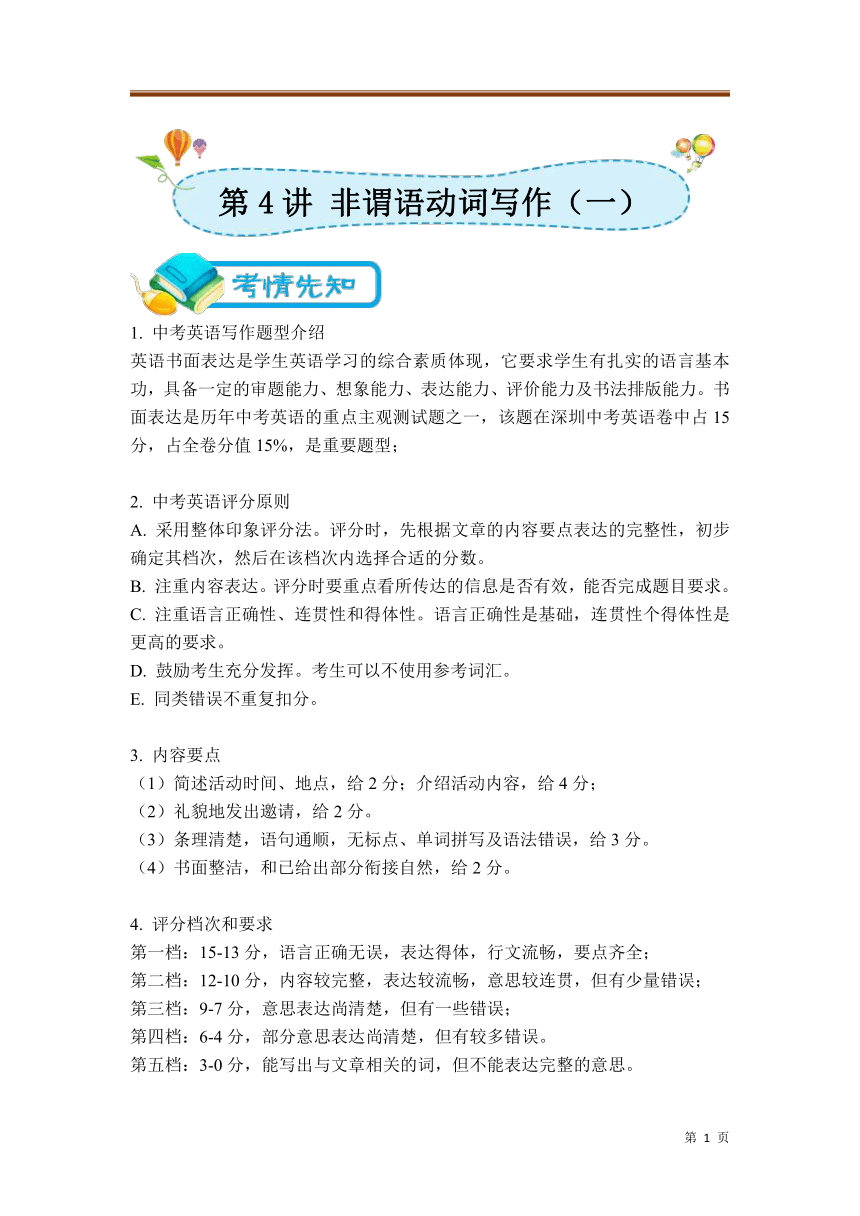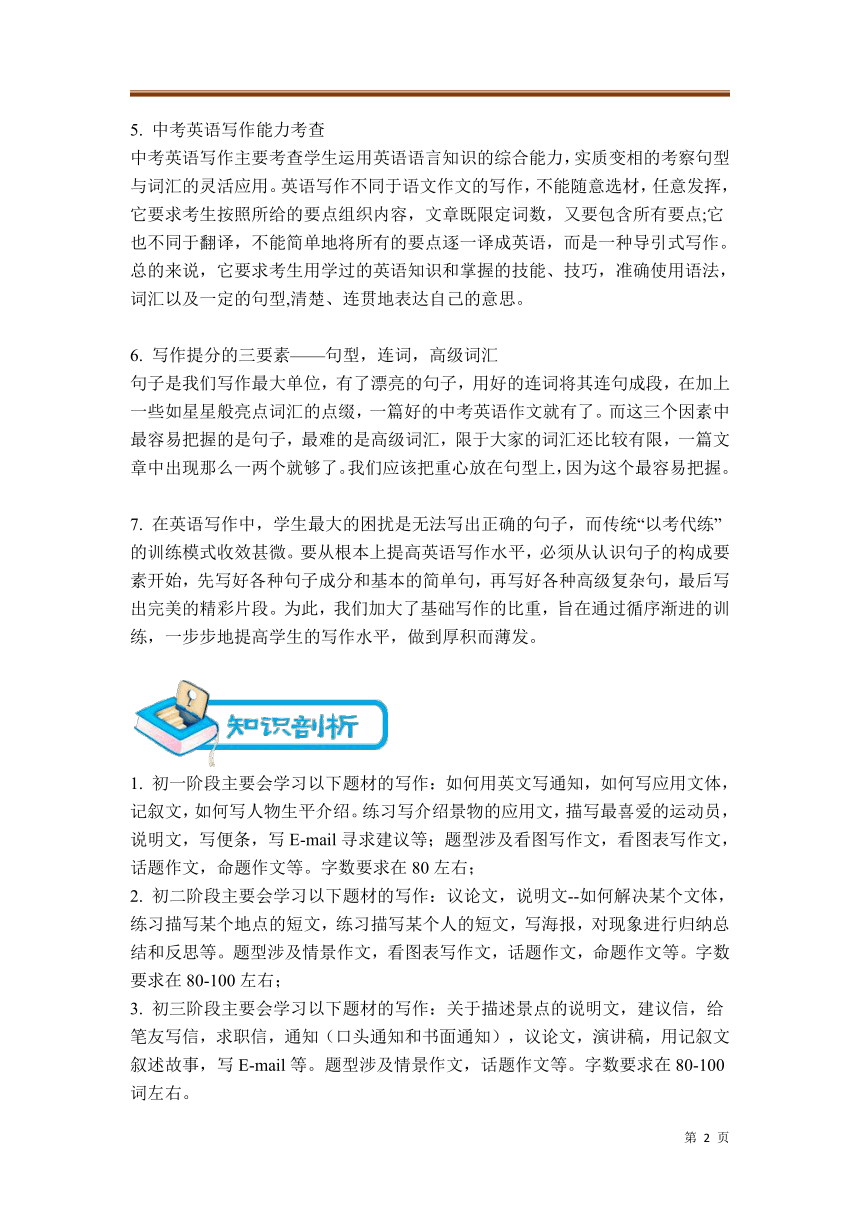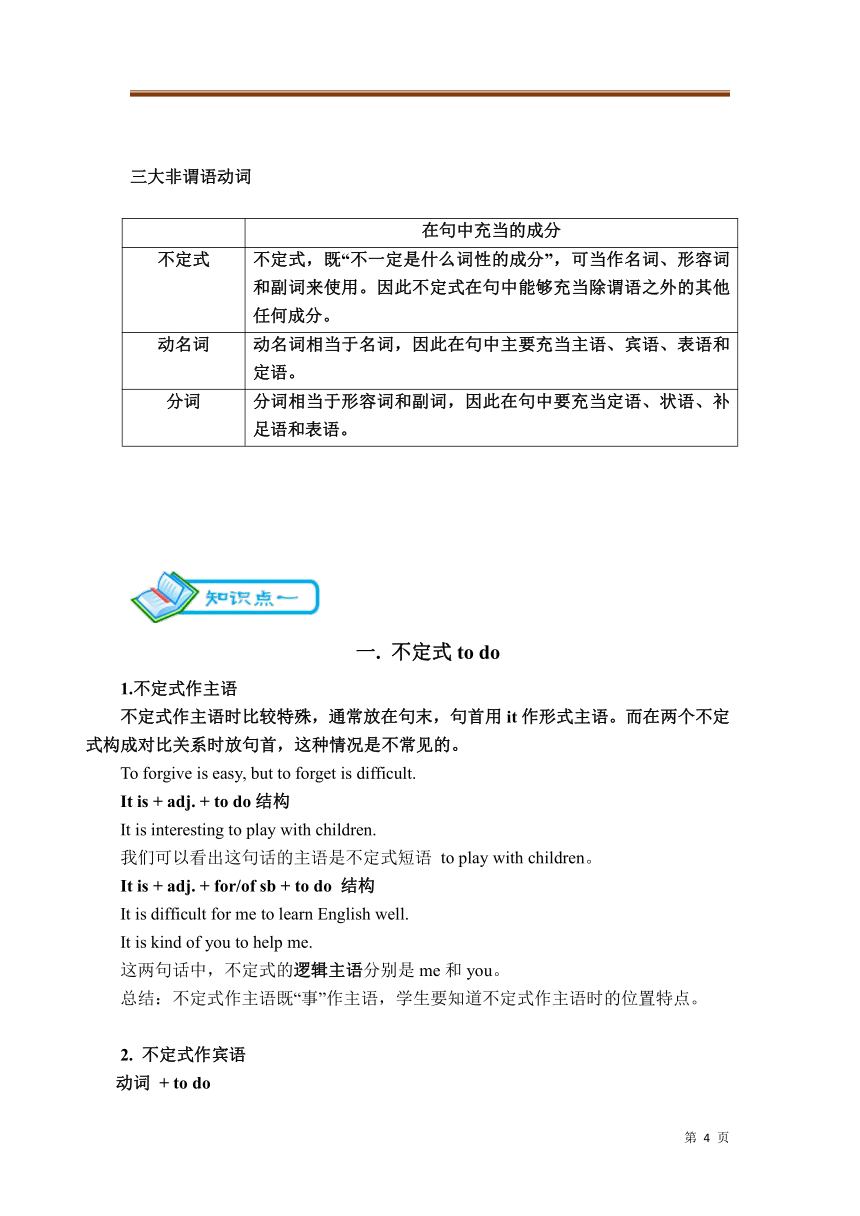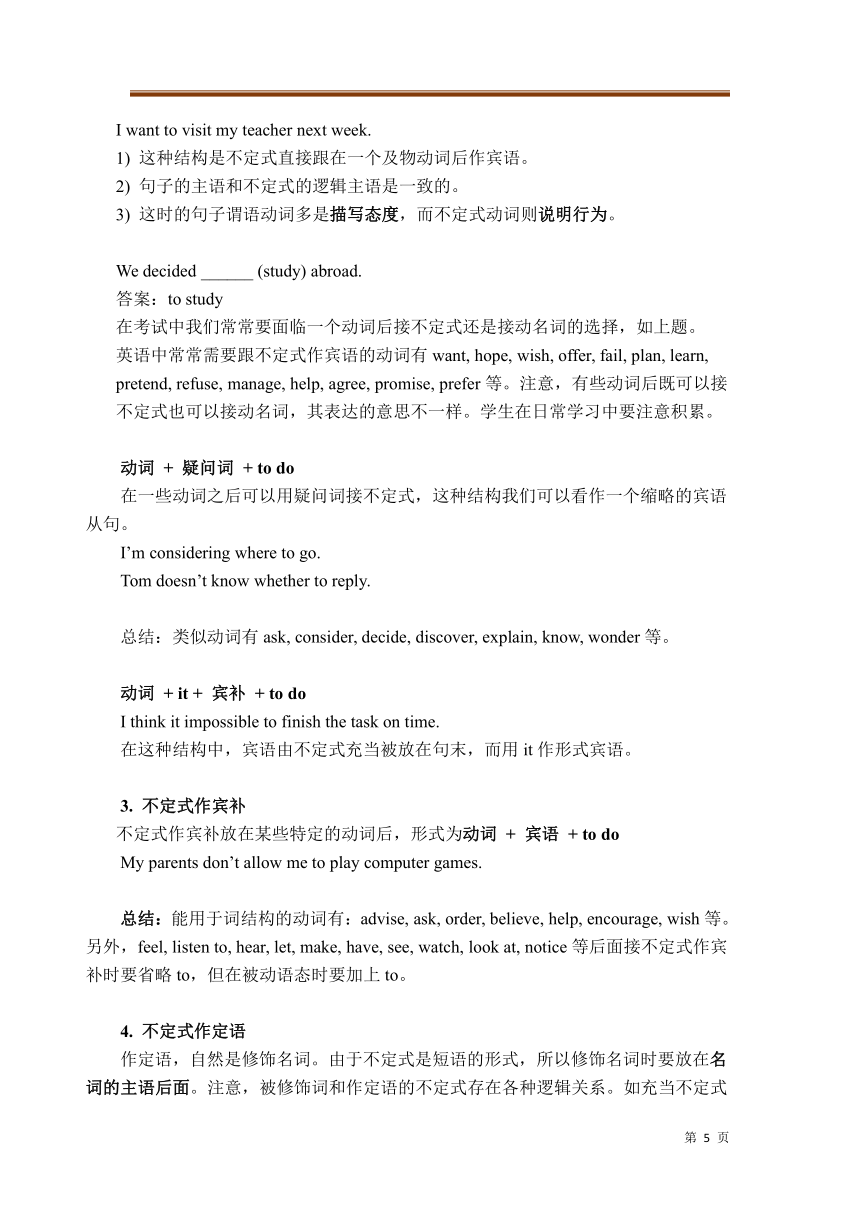2021年深圳沪教版初三英语专题非谓语动词写作(一)讲义 (含答案)
文档属性
| 名称 | 2021年深圳沪教版初三英语专题非谓语动词写作(一)讲义 (含答案) |

|
|
| 格式 | zip | ||
| 文件大小 | 308.3KB | ||
| 资源类型 | 教案 | ||
| 版本资源 | 牛津深圳版 | ||
| 科目 | 英语 | ||
| 更新时间 | 2021-05-16 00:00:00 | ||
图片预览





文档简介
中考英语写作题型介绍
英语书面表达是学生英语学习的综合素质体现,它要求学生有扎实的语言基本功,具备一定的审题能力、想象能力、表达能力、评价能力及书法排版能力。书面表达是历年中考英语的重点主观测试题之一,该题在深圳中考英语卷中占15分,占全卷分值15%,是重要题型;
中考英语评分原则
采用整体印象评分法。评分时,先根据文章的内容要点表达的完整性,初步确定其档次,然后在该档次内选择合适的分数。
注重内容表达。评分时要重点看所传达的信息是否有效,能否完成题目要求。
注重语言正确性、连贯性和得体性。语言正确性是基础,连贯性个得体性是更高的要求。
鼓励考生充分发挥。考生可以不使用参考词汇。
同类错误不重复扣分。
3.
内容要点
简述活动时间、地点,给2分;介绍活动内容,给4分;
礼貌地发出邀请,给2分。
条理清楚,语句通顺,无标点、单词拼写及语法错误,给3分。
书面整洁,和已给出部分衔接自然,给2分。
4.
评分档次和要求
第一档:15-13分,语言正确无误,表达得体,行文流畅,要点齐全;
第二档:12-10分,内容较完整,表达较流畅,意思较连贯,但有少量错误;
第三档:9-7分,意思表达尚清楚,但有一些错误;
第四档:6-4分,部分意思表达尚清楚,但有较多错误。
第五档:3-0分,能写出与文章相关的词,但不能表达完整的意思。
5.
中考英语写作能力考查
中考英语写作主要考查学生运用英语语言知识的综合能力,实质变相的考察句型与词汇的灵活应用。英语写作不同于语文作文的写作,不能随意选材,任意发挥,它要求考生按照所给的要点组织内容,文章既限定词数,又要包含所有要点;它也不同于翻译,不能简单地将所有的要点逐一译成英语,而是一种导引式写作。总的来说,它要求考生用学过的英语知识和掌握的技能、技巧,准确使用语法,词汇以及一定的句型,清楚、连贯地表达自己的意思。
6.
写作提分的三要素——句型,连词,高级词汇
句子是我们写作最大单位,有了漂亮的句子,用好的连词将其连句成段,在加上一些如星星般亮点词汇的点缀,一篇好的中考英语作文就有了。而这三个因素中最容易把握的是句子,最难的是高级词汇,限于大家的词汇还比较有限,一篇文章中出现那么一两个就够了。我们应该把重心放在句型上,因为这个最容易把握。
7.
在英语写作中,学生最大的困扰是无法写出正确的句子,而传统“以考代练”的训练模式收效甚微。要从根本上提高英语写作水平,必须从认识句子的构成要素开始,先写好各种句子成分和基本的简单句,再写好各种高级复杂句,最后写出完美的精彩片段。为此,我们加大了基础写作的比重,旨在通过循序渐进的训练,一步步地提高学生的写作水平,做到厚积而薄发。
1.
初一阶段主要会学习以下题材的写作:如何用英文写通知,如何写应用文体,
记叙文,如何写人物生平介绍。练习写介绍景物的应用文,描写最喜爱的运动员,说明文,写便条,写E-mail寻求建议等;题型涉及看图写作文,看图表写作文,话题作文,命题作文等。字数要求在80左右;
2.
初二阶段主要会学习以下题材的写作:议论文,说明文--如何解决某个文体,练习描写某个地点的短文,练习描写某个人的短文,写海报,对现象进行归纳总结和反思等。题型涉及情景作文,看图表写作文,话题作文,命题作文等。字数要求在80-100左右;
3.
初三阶段主要会学习以下题材的写作:关于描述景点的说明文,建议信,给笔友写信,求职信,通知(口头通知和书面通知),议论文,演讲稿,用记叙文叙述故事,写E-mail等。题型涉及情景作文,话题作文等。字数要求在80-100词左右。
非谓语动词:
非谓语动词既在句中不作谓语的动词,共有不定式、动名词、现在分词和过去分词四种。
非谓语动词作为动词的一种变化形式,仍保留动词的特征,比如有自己的逻辑主语、宾语、表语或状语。我们将非谓语动词和其宾语、表语或状语一起称作非谓语动词短语。
非谓语动词作句子成分是它们非动词特征的体现,这是学习的重点。
非谓语动词的判定方法:
考虑句中谓语动词以及其他词语同非谓语动词的关系和对非谓语动词形式的限制,选择正确的非谓语动词。
三大非谓语动词
在句中充当的成分
不定式
不定式,既“不一定是什么词性的成分”,可当作名词、形容词和副词来使用。因此不定式在句中能够充当除谓语之外的其他任何成分。
动名词
动名词相当于名词,因此在句中主要充当主语、宾语、表语和定语。
分词
分词相当于形容词和副词,因此在句中要充当定语、状语、补足语和表语。
一.
不定式to
do
1.不定式作主语
不定式作主语时比较特殊,通常放在句末,句首用it作形式主语。而在两个不定式构成对比关系时放句首,这种情况是不常见的。
To
forgive
is
easy,
but
to
forget
is
difficult.
It
is
+
adj.
+
to
do结构
It
is
interesting
to
play
with
children.
我们可以看出这句话的主语是不定式短语
to
play
with
children。
It
is
+
adj.
+
for/of
sb
+
to
do
结构
It
is
difficult
for
me
to
learn
English
well.
It
is
kind
of
you
to
help
me.
这两句话中,不定式的逻辑主语分别是me和you。
总结:不定式作主语既“事”作主语,学生要知道不定式作主语时的位置特点。
不定式作宾语
动词
+
to
do
I
want
to
visit
my
teacher
next
week.
这种结构是不定式直接跟在一个及物动词后作宾语。
句子的主语和不定式的逻辑主语是一致的。
这时的句子谓语动词多是描写态度,而不定式动词则说明行为。
We
decided
______
(study)
abroad.
答案:to
study
在考试中我们常常要面临一个动词后接不定式还是接动名词的选择,如上题。
英语中常常需要跟不定式作宾语的动词有want,
hope,
wish,
offer,
fail,
plan,
learn,
pretend,
refuse,
manage,
help,
agree,
promise,
prefer等。注意,有些动词后既可以接不定式也可以接动名词,其表达的意思不一样。学生在日常学习中要注意积累。
动词
+
疑问词
+
to
do
在一些动词之后可以用疑问词接不定式,这种结构我们可以看作一个缩略的宾语从句。
I’m
considering
where
to
go.
Tom
doesn’t
know
whether
to
reply.
总结:类似动词有ask,
consider,
decide,
discover,
explain,
know,
wonder等。
动词
+
it
+
宾补
+
to
do
I
think
it
impossible
to
finish
the
task
on
time.
在这种结构中,宾语由不定式充当被放在句末,而用it作形式宾语。
不定式作宾补
不定式作宾补放在某些特定的动词后,形式为动词
+
宾语
+
to
do
My
parents
don’t
allow
me
to
play
computer
games.
总结:能用于词结构的动词有:advise,
ask,
order,
believe,
help,
encourage,
wish等。
另外,feel,
listen
to,
hear,
let,
make,
have,
see,
watch,
look
at,
notice等后面接不定式作宾补时要省略to,但在被动语态时要加上to。
不定式作定语
作定语,自然是修饰名词。由于不定式是短语的形式,所以修饰名词时要放在名词的主语后面。注意,被修饰词和作定语的不定式存在各种逻辑关系。如充当不定式的宾语、主语、同位语、状语、补语等。
He
is
the
only
person
to
blame.(person作不定式的动词的宾语)
I
need
a
pen
to
write
with.
(pen作不定式中介词with的宾语)
Tom
is
the
first
one
to
reach
the
terminal.(one作不定式的逻辑主语)
The
time
to
go
is
not
decided.
(time
作不定式的时间状语)
不定式作状语
To
get
a
good
grade,
she
practices
day
and
night.
(不定式作目的状语,放句首表强调。)
The
farmers
work
hard
in
order
to/so
as
to
raise
their
children.(不定式作目的状语)
They
hurried
to
the
airport,
only
to
find
the
plane
had
already
taken
off.
(不定式作结果状语)
She
was
so
hungry
as
to
eat
five
bowels
of
rice.
(不定式作结果状语)
The
boy
is
old
enough
to
go
to
school.
(不定式作结果状语)
The
girl
is
too
young
to
go
to
school.
(不定式作结果状语,肯定形式,否定意思)
I
am
glad
to
hear
from
you.
(不定式作原因状语)
总结:不定式作状语的情况,最重要的是作目的状语。另外,学生要掌握in
order
to,
only
to,
so...as
to,
...enough
to,
too...to等搭配的含义及其所接的成分,从而灵活运用这些短语。
仿写练习
(一)不定式作主语
It
is
not
easy
to
master
a
foreign
language
in
such
short
time.
在如此短暂的时间里掌握一门外语是不容易的。
【即学即练】
1.对我们来说,保护环境是很有必要的。_________________________________________________
2.在图书馆大声说话是不好的。_____________________________________________________
3.坐公交出行是很方便的。_____________________________________________________
4.
对他来时,完成这项艰难的任务的可能的。______________________________________________________
5.对老师说你好是礼貌的。_______________________________________________________
【参考答案】
It
is
necessary
to
protect
the
environment.
It
is
not
good
to
speak
loudly
in
the
library.
It
is
convenient
to
travel
by
bus.
It
is
possible
for
him
to
finish
the
difficult
task.
5.
It
is
polite
to
say
hello
to
teacher.
(二)不定式作宾语
I
hope
to
hear
from
you
soon.
我希望很快收到你的来信。
【即学即练】
1.我负担不起旅游的费用。_____________________________________________________
2.
妈妈同意今晚在外面吃饭。__________________________________________________
3.我忘记关灯了。
_____________________________________________
4.少先队员们(Young
Pioneer)主动帮助这个残疾人。_____________________________________________________
5.我不知道如何回答你的问题。_____________________________________________
6.
我觉得取得好成绩很难。
_________________________________________
【参考答案】
I
can’t
afford
to
go
on
a
trip.
My
mum
agreed
to
eat
outside
tonight.
I
forgot
to
turn
off
the
lights.
The
Young
Pioneers
offered
to
help
the
disabled
man.
I
don’t
know
how
to
answer
your
question.
I
think
it
hard
to
get
good
grades.
(三)动词不定式作宾补
Our
father
advised
us
to
study
hard
when
we
were
young.在我们小的时候,我们的爸爸建议我们努力学习。
【即学即练】
1.妈妈经常叫我打扫我的房间。_____________________________________________
2.老师总是鼓励我做一个勤奋的学生。___________________________________________
3.爸爸不允许我吸烟。
_____________________________________________
4.
我经常看到这个盲人照顾他的花。____________________________________________
5.
我想要你们所有人安静。
______________________________________________
【参考答案】
My
mother
often
asks
me
to
clean
my
room.
2.
The
teacher
always
encourages
me
to
be
a
hard-working
student.
3.
My
father
doesn’t
allow
me
to
smoke.
4.
I
often
see
him
look
after
his
flowers.
5.
I
want
all
of
you
to
be
quiet.
不定式作定语
Lily
is
the
last
one
to
appear.
Lily是最后一个出现的人。
【即学即练】
我需要一些纸来写。
__________________________________________________
2.Mr.
Smith有一个会议要参加。_____________________________________________
3.我没有地方居住。
_____________________________________________
他是这次事故中唯一幸存(survive)的人。
_____________________________________________
我们还没找到一个吃饭的地方。
_____________________________________________
【参考答案】
1.
I
need
some
paper
to
write
on.
2.
Mr.
Smithhas
a
meeting
to
attend.
3.
I
have
no
place
to
live
in.
4.
He
is
the
only
one
to
survive
in
the
accident.
5.
We
haven’t
found
a
place
to
eat
yet.
(五)动词不定式作状语
The
little
boy
jumps
to
reach
the
apples.
小男孩跳起来去摘苹果。
【即学即练】
1.为了准时到达,我们选择坐飞机。__________________________________________________
2.Lily每天都锻炼来保持健康.
_______________________________________________
我很开心参加这个活动。
____________________________________________
他太胖而不能穿过这个洞。
________________________________
他足够强壮来打败他的敌人。____________________________________________
她努力学习,却发现她没有通过考试。
____________________________________________
【参考答案】
1.
In
order
to
arrive
on
time,
we
choose
to
take
a
plane.
2.
Lily
exercise
every
day
in
order
to/so
as
to
keep
fit.
3.
I
am
very
happy
to
take
part
in
this
activity.
4.He
is
too
fat
to
get
through
the
hole.
5.
He
is
strong
enough
to
beat
his
enemy.
6.
She
had
studied
hard,
only
to
find
she
didn’t
pass
the
exam.
二.动名词doing
1.动名词作主语
与不定式不同,动名词作主语一般直接放句首,只有在某些特定的句型中才会出现用动名词作为真正的主语置于句末的情况。
Finding
a
job
in
China
is
not
difficult.
Using
a
language
can
help
us
to
master
the
language
fast.
在某些特定句型中动名词需后置。
It
is
no
use/no
good
doing
sth.
It
is
no
use
talking
too
much
with
her.
It
is
no
good
crying
over
spilt
milk.
动名词作宾语
动名词主要放在某些特定的动词或介词后作宾语,此外,还有在一些特定句型中。
I’m
considering
buying
a
new
computer
because
the
old
one
is
broken.
You
should
give
up
smoking
if
you
want
to
be
healthy.
总结:通常接动名词作宾语的动词有admit,
advise,
suggest,
avoid,
consider,
discuss,
imagine,
give
up,
can’t
help,
mind,
permit,
put
off,
risk等。
have
difficulty/trouble/problems/fun/a
good
time
(in)
doing
sth.
在这些句型中要用不定式作宾语。
We
had
a
good
time
making
snow
men.
I
have
difficulty
learn
English
well.
3.
动名词作表语
动名词作表语主要用来说明主语的具体内容。
My
job
is
teaching.
His
hobby
is
collecting
stamps.
4.
动名词作定语
主要放在被修饰的名词前,表示其用途。
a
reading
room
a
swimming
pool
注意:有些动词两者都可以接,但是表示的意思不同。
continue
to
do
something继续做之前做的事
continue
doing
something继续做同一件事
forget
to
do
something忘记去做某事
forget
doing
something忘记做了某事
remember
to
do
something记得去做某事
remember
doing
something记得做过某事
try
to
do
something尽力去做某事
try
doing
something试着去做某事
mean
to
do
something打算做某事
mean
doing
something意味着做某事
仿写练习
I
remember
closing
the
doors
of
the
classroom.
我记得关了教室的门。
【即学即练】
记忆新单词对英语学习有帮助。
_____________________________________
2.
抱怨太多是没有用的。
__________________________________________
那个小偷已经承认了偷东西。
________________________________________
我花了3小时来遛我的狗。
_________________________________________________________________
5.汤姆在阅览室吗?
_________________________________________________________________
我喜欢阅读各种书籍。
_________________________________________________________________
那个司机停下来去帮助一个老奶奶过马路。
_________________________________________________________________
我现在需要洗个澡。
_________________________________________________________________
你的花需要浇水了。
_________________________________________________________________
记得明天把你的家庭作业带过来。
_________________________________________________________________
我很遗憾那么早离开学校。
_________________________________________________________________
我在学英语方面有困难。
_________________________________________________________________
【参考答案】
1.
Remembering
new
words
is
helpful
for
English
learning.
2.
It
is
no
use
complaining
too
much.
3.
The
thief
has
admitted
stealing
things.
4.
I
spent
3
hours
walking
my
dog.
5.
Is
tom
in
the
reading
room?
6.
I
like
reading
all
kinds
of
books.
7.
The
driver
stopped
to
help
an
old
lady
cross
the
street.
8.
I
need
to
take
a
bath
now.
9.
Your
flowers
need
watering/to
be
watered.
10.
Remember
to
bring
your
homework
here
tomorrow.
11.
I
regret
leaving
school
so
early.
12.
I
have
difficulty
learning
English.
分词doing和done
分词有现在分词-ing和过去分词-ed之分,有形容词和副词的作用,在句中充当定语、状语、补语等。
从时态和语态的角度看,现在分词主要表示正在进行的或主动的动作。而过去分词则主要表示已经完成的或被动的动作。
A
sinking
ship一艘正在下沉的船
A
sunken
ship一艘已经沉于水底的船
Looking
at
him,
I
didn’t
say
anything.看着他,我一句话也没说。
Given
more
time,
I
could
do
it
better.再多给一点时间,我可以做得更好。
分词作状语
分词作状语是分词用法核心之一,掌握其用法,我们要先掌握分词作状语的各种结构。
单独的分词(短语)作状语
分词前没有带名词,直接把分词短语作状语。分词的逻辑主语必须与句子的主语一致。表示时间、原因、条件、让步、结果、方式、伴随等等。
Be
careful
when
using
these
tools.(分词表时间)
Supported
by
my
parents,
I
set
off
to
seek
my
dream.(分词表条件)
Being
interested
in
the
real
intention
of
the
man,
I
followed
him.(分词表原因)
Having
lived
in
China
for
many
years,
he
still
can’t
speak
Chinese.(分词表让步)
I
went
to
work,
finding
the
door
locked.
(分词表结果,通常放句末)
Crying,
the
little
boy
went
out.(分词表方式)
I
began
as
a
common
man,
farming
in
my
fields
in
Nanyang,
doing
what
I
could
to
survive
in
an
age
of
chaos.臣本布衣,躬耕于南阳,苟全性命于乱世。(分词表伴随、补充说明)
名词+分词
作状语
这种结构中,分词短语的逻辑主语和句子的主语是不一致的,分词有自己的独立的主语,表示的意思和“分词(短语)作状语”差不多,时间、原因、条件、让步、伴随等等。这就是“独立主格结构”的一种“独立分词结构”。
Weather
permitting,
we
will
go
for
a
picnic
tomorrow.(分词表条件)
Nobody
being
absent,
let’s
begin
the
meeting.(分词表原因)
All
paper
having
been
used
up,
he
has
to
buy
some.(分词表原因)
with+名词+分词
作状语
这种结构与“名词+分词”作状语一样表示伴随状况、具体举例、补充说明或原因。
A
man
came
in,
with
a
dead
dog
hung
on
his
back.
I
always
come
home
with
my
cat
welcoming
me.
固定结构
副词(strictly/generally...)
+
speaking
这种结构是对单独的分词短语作状语的一个补充,在这种固定结构中,分词短语的逻辑主语和句子的主语是不一致的,但因为这种表达已是约定俗成的固定结构,所以不认为错。
Strictly
speaking,
we
are
in
China
now.
小结:“分词作状语”分词本身没有主语,其逻辑主语和句子的主语一致。
而“名词+分词作状语”
和
“with+名词+分词作状语”
这两种结构中,句子的逻辑主语是句子所带的名词,称为独立主格结构。
仿写练习
(一)分词作状语
Generally
speaking,
women
are
more
emotional
than
men.
通常来说,女人比男人更感性。
Added
to
sugar,
water
will
taste
sweet.
加入糖,水将会尝起来很甜。
【即学即练】
1.被妈妈叫醒,小男孩很生气。
_________________________________________________________________
2.作为一名医生,她喜欢帮助别人。
_________________________________________________________________
3.走路回家的时候,我意识到把钥匙落在教室了。
_________________________________________________________________
4.学了四年英语,我仍然写不好作文。
_________________________________________________________________
5.王后安静地坐着,一个小提琴家为她拉着琴。
_________________________________________________________________
大家都离开了,我关掉了门。
_________________________________________________________________
微笑着,老师走进了教室。
_________________________________________________________________
由于国王命令,他自杀了。
_________________________________________________________________
【参考答案】
Awaken
by
his
mother,
the
little
boy
was
very
angry.
Being
a
doctor,
she
likes
helping
others.
Walking
home,
I
realized
I
had
left
the
key
in
the
classroom.
Having
learnt
English
for
4
years,
I
still
can’t
write
compositions
well.
The
queen
sat
quietly,
with
a
violinist
playing
for
her.
Everybody
having
left,
I
closed
the
door.
Smiling,
the
teacher
walked
in
the
classroom.
Ordered
by
the
king,
he
killed
himself.
2.分词作定语
分词作状语的位置有两种,当一个分词作定语时,置于名词之前,而分词短语作定语时,置于名词之后。
The
broken
door
looks
old.
The
girl
singing
cheerfully
is
my
younger
sister.
I
like
the
wallet
put
on
the
desk.
China
is
a
developing
country.
小结:
现在分词与动名词的区别:动名词作定语时,和它所修饰的名词没有逻辑上的主谓关系。而分词作定语时,和它所修饰的名词有逻辑上的主谓关系。
a
swimming
pool(动名词作定语)
the
boiled
water(分词作定语)
仿写练习
(一)分词作定语
Germany
is
a
developed
country.
德国是个发达国家。
【即学即练】
1.在那里看书的男生是我的弟弟。
_________________________________________________________________
2.你听过用英文唱这首歌吗?
_________________________________________________________________
3.那只正在上升的气球看起来很美。
_________________________________________________________________
4.不要为打翻的牛奶哭泣。
_________________________________________________________________
【参考答案】
The
boy
reading
book
there
is
my
younger
brother.
Have
you
listened
to
this
song
sung
in
English?
The
rising
balloon
looks
beautiful.
Don’t
cry
the
split
milk.
2.分词作定语
分词在感觉动词后面充当补足语。这样的感觉动词包括:find,
hear,
see,
smell,
observe,
watch,
notice等。
I
hear
the
baby
next
door
crying
loudly.
I
find
the
dog
hit
many
times
by
its
owner.
在这些动词后,也可以用省略to的不定式作补语,它们的区别是:现在分词,强调动作正在进行;不定式则表示一般的动作或一个动作自始至终的全过程。
I
watched
them
playing
basketball.我看到他们正在打篮球。
I
watched
them
play
basketball.我观看他们打完篮球。
仿写练习
(一)分词作补语
I
saw
a
UFO
flying
into
the
sky.
我看到一个不明飞行物飞向天空。
【即学即练】
1.我听到汤姆唱了一首美妙的歌。
_________________________________________________________________
2.我看到一些孩子们在快乐地玩耍。
_________________________________________________________________
3.我听到有人正在树林里大声地说英语。
_________________________________________________________________
4.我注意到我的钥匙被落在车上。
_________________________________________________________________
【参考答案】
I
heard
Tom
sing
a
wonderful
song.
I
saw
some
children
playing
happily.
I
hear
someone
speaking
English
loudly
in
the
forest.
I
noticed
my
key
left
in
the
car.
一.用所给动词的适当形式填空。
1.
-Listen
to
me,
the
last
one____________(arrive)
pays
the
meal
-We
agree!
2.
They
hurried
to
the
whole
street___________(look)
for
their
lost
child
3.
Tim
pretended___________(read)a
book,
when
his
parents
came
into
his
bedroom
4.
_________(walk)
is
a
good
form
of
exercise
for
both
the
young
and
the
old.
5.
I
can't
stand___________(work)with
Helen
in
the
same
office.
She
just
refuses_________(stop)talking
while
she
works
6.
As
a
result
of
the
serious
earthquake,
two
thirds
of
the
buildings
in
the
area
need_________(repair).
7.
Having
been
ill
in
bed
for
nearly
a
month,
Carry
had
a
hard
time________(pass)
the
exam.
8.
They
believe
that's
the
best
way
to
prevent
such
a
thing
from__________(
happen)
again.
9.
It
was
so
cold
that
we
kept
the
fire__________(burn)all
night
10.
-Did
your
brother
fix
the
computer
himself?
-He
had
it_________(fix),
because
he
doesn't
know
much
about
computers.
11.
The
teacher
had
to
shout
to
make
herself_________(hear)above
the
sound
of
the
music.
12.
Kitty
can't
see
the
words
on
the
blackboard,
so
she
needs
to
have
her
eyes__________(examine).
二、选择填空。
(
)1."We
can’t
go
out
in
this
weather,
"
said
Mr.
Lin,
_________out
of
the
window
A.
looking
B.
to
look
C.
looked
D.
having
looked
(
)2.
My
English
teacher
encouraged__________a
summer
course
to
improve
my
English.
A.
for
me
taking
B.
me
taking
C.
for
me
to
take
D.
me
to
take
(
)3.
You
will
be
immediately
fired
if
you
are
found__________in
the
kitchen.
A.
smoke
B.
smoking
C.
to
smoke
D.
smoked
(
)4.-Her
brother
enjoys_________basketball
on
Sunday
afternoons,
doesn't
he?
-Yes,
he
does.
But
what
her
sister
enjoys_________.
A.
to
play,
dancing
B.
playing;
to
dance
C.
to
play:
to
dance
D.
playing;
is
to
dance
(
)5.-Have
you
made
up
your
mind________the
chance
to
go
to
France?
-No.
I'm
practicing________French.
A.
to
give
up;
to
speak
B.
to
give
up;
speaking
C.
giving
up;
to
speak
D.
giving
up;
speaking
(
)6.
Never_______off
your
coat;
it's
rather
cold
outside
A.
take
B.
taking
C.
to
take
D.
taken
【参考答案】
一.
1.
to
arrive
2.
to
look
3.
reading
4.
Walking
5.
working
6.
repairing
7.
passing
8.
happening
9.
burning
10.
fixed
11.heard
12.examined
二.ADBBBA
学生易错点整理:
_________________________________________________________________________________________________________________________________________________________________________________________________________________________________________________________________________________________________________________________________________________________
英语书面表达是学生英语学习的综合素质体现,它要求学生有扎实的语言基本功,具备一定的审题能力、想象能力、表达能力、评价能力及书法排版能力。书面表达是历年中考英语的重点主观测试题之一,该题在深圳中考英语卷中占15分,占全卷分值15%,是重要题型;
中考英语评分原则
采用整体印象评分法。评分时,先根据文章的内容要点表达的完整性,初步确定其档次,然后在该档次内选择合适的分数。
注重内容表达。评分时要重点看所传达的信息是否有效,能否完成题目要求。
注重语言正确性、连贯性和得体性。语言正确性是基础,连贯性个得体性是更高的要求。
鼓励考生充分发挥。考生可以不使用参考词汇。
同类错误不重复扣分。
3.
内容要点
简述活动时间、地点,给2分;介绍活动内容,给4分;
礼貌地发出邀请,给2分。
条理清楚,语句通顺,无标点、单词拼写及语法错误,给3分。
书面整洁,和已给出部分衔接自然,给2分。
4.
评分档次和要求
第一档:15-13分,语言正确无误,表达得体,行文流畅,要点齐全;
第二档:12-10分,内容较完整,表达较流畅,意思较连贯,但有少量错误;
第三档:9-7分,意思表达尚清楚,但有一些错误;
第四档:6-4分,部分意思表达尚清楚,但有较多错误。
第五档:3-0分,能写出与文章相关的词,但不能表达完整的意思。
5.
中考英语写作能力考查
中考英语写作主要考查学生运用英语语言知识的综合能力,实质变相的考察句型与词汇的灵活应用。英语写作不同于语文作文的写作,不能随意选材,任意发挥,它要求考生按照所给的要点组织内容,文章既限定词数,又要包含所有要点;它也不同于翻译,不能简单地将所有的要点逐一译成英语,而是一种导引式写作。总的来说,它要求考生用学过的英语知识和掌握的技能、技巧,准确使用语法,词汇以及一定的句型,清楚、连贯地表达自己的意思。
6.
写作提分的三要素——句型,连词,高级词汇
句子是我们写作最大单位,有了漂亮的句子,用好的连词将其连句成段,在加上一些如星星般亮点词汇的点缀,一篇好的中考英语作文就有了。而这三个因素中最容易把握的是句子,最难的是高级词汇,限于大家的词汇还比较有限,一篇文章中出现那么一两个就够了。我们应该把重心放在句型上,因为这个最容易把握。
7.
在英语写作中,学生最大的困扰是无法写出正确的句子,而传统“以考代练”的训练模式收效甚微。要从根本上提高英语写作水平,必须从认识句子的构成要素开始,先写好各种句子成分和基本的简单句,再写好各种高级复杂句,最后写出完美的精彩片段。为此,我们加大了基础写作的比重,旨在通过循序渐进的训练,一步步地提高学生的写作水平,做到厚积而薄发。
1.
初一阶段主要会学习以下题材的写作:如何用英文写通知,如何写应用文体,
记叙文,如何写人物生平介绍。练习写介绍景物的应用文,描写最喜爱的运动员,说明文,写便条,写E-mail寻求建议等;题型涉及看图写作文,看图表写作文,话题作文,命题作文等。字数要求在80左右;
2.
初二阶段主要会学习以下题材的写作:议论文,说明文--如何解决某个文体,练习描写某个地点的短文,练习描写某个人的短文,写海报,对现象进行归纳总结和反思等。题型涉及情景作文,看图表写作文,话题作文,命题作文等。字数要求在80-100左右;
3.
初三阶段主要会学习以下题材的写作:关于描述景点的说明文,建议信,给笔友写信,求职信,通知(口头通知和书面通知),议论文,演讲稿,用记叙文叙述故事,写E-mail等。题型涉及情景作文,话题作文等。字数要求在80-100词左右。
非谓语动词:
非谓语动词既在句中不作谓语的动词,共有不定式、动名词、现在分词和过去分词四种。
非谓语动词作为动词的一种变化形式,仍保留动词的特征,比如有自己的逻辑主语、宾语、表语或状语。我们将非谓语动词和其宾语、表语或状语一起称作非谓语动词短语。
非谓语动词作句子成分是它们非动词特征的体现,这是学习的重点。
非谓语动词的判定方法:
考虑句中谓语动词以及其他词语同非谓语动词的关系和对非谓语动词形式的限制,选择正确的非谓语动词。
三大非谓语动词
在句中充当的成分
不定式
不定式,既“不一定是什么词性的成分”,可当作名词、形容词和副词来使用。因此不定式在句中能够充当除谓语之外的其他任何成分。
动名词
动名词相当于名词,因此在句中主要充当主语、宾语、表语和定语。
分词
分词相当于形容词和副词,因此在句中要充当定语、状语、补足语和表语。
一.
不定式to
do
1.不定式作主语
不定式作主语时比较特殊,通常放在句末,句首用it作形式主语。而在两个不定式构成对比关系时放句首,这种情况是不常见的。
To
forgive
is
easy,
but
to
forget
is
difficult.
It
is
+
adj.
+
to
do结构
It
is
interesting
to
play
with
children.
我们可以看出这句话的主语是不定式短语
to
play
with
children。
It
is
+
adj.
+
for/of
sb
+
to
do
结构
It
is
difficult
for
me
to
learn
English
well.
It
is
kind
of
you
to
help
me.
这两句话中,不定式的逻辑主语分别是me和you。
总结:不定式作主语既“事”作主语,学生要知道不定式作主语时的位置特点。
不定式作宾语
动词
+
to
do
I
want
to
visit
my
teacher
next
week.
这种结构是不定式直接跟在一个及物动词后作宾语。
句子的主语和不定式的逻辑主语是一致的。
这时的句子谓语动词多是描写态度,而不定式动词则说明行为。
We
decided
______
(study)
abroad.
答案:to
study
在考试中我们常常要面临一个动词后接不定式还是接动名词的选择,如上题。
英语中常常需要跟不定式作宾语的动词有want,
hope,
wish,
offer,
fail,
plan,
learn,
pretend,
refuse,
manage,
help,
agree,
promise,
prefer等。注意,有些动词后既可以接不定式也可以接动名词,其表达的意思不一样。学生在日常学习中要注意积累。
动词
+
疑问词
+
to
do
在一些动词之后可以用疑问词接不定式,这种结构我们可以看作一个缩略的宾语从句。
I’m
considering
where
to
go.
Tom
doesn’t
know
whether
to
reply.
总结:类似动词有ask,
consider,
decide,
discover,
explain,
know,
wonder等。
动词
+
it
+
宾补
+
to
do
I
think
it
impossible
to
finish
the
task
on
time.
在这种结构中,宾语由不定式充当被放在句末,而用it作形式宾语。
不定式作宾补
不定式作宾补放在某些特定的动词后,形式为动词
+
宾语
+
to
do
My
parents
don’t
allow
me
to
play
computer
games.
总结:能用于词结构的动词有:advise,
ask,
order,
believe,
help,
encourage,
wish等。
另外,feel,
listen
to,
hear,
let,
make,
have,
see,
watch,
look
at,
notice等后面接不定式作宾补时要省略to,但在被动语态时要加上to。
不定式作定语
作定语,自然是修饰名词。由于不定式是短语的形式,所以修饰名词时要放在名词的主语后面。注意,被修饰词和作定语的不定式存在各种逻辑关系。如充当不定式的宾语、主语、同位语、状语、补语等。
He
is
the
only
person
to
blame.(person作不定式的动词的宾语)
I
need
a
pen
to
write
with.
(pen作不定式中介词with的宾语)
Tom
is
the
first
one
to
reach
the
terminal.(one作不定式的逻辑主语)
The
time
to
go
is
not
decided.
(time
作不定式的时间状语)
不定式作状语
To
get
a
good
grade,
she
practices
day
and
night.
(不定式作目的状语,放句首表强调。)
The
farmers
work
hard
in
order
to/so
as
to
raise
their
children.(不定式作目的状语)
They
hurried
to
the
airport,
only
to
find
the
plane
had
already
taken
off.
(不定式作结果状语)
She
was
so
hungry
as
to
eat
five
bowels
of
rice.
(不定式作结果状语)
The
boy
is
old
enough
to
go
to
school.
(不定式作结果状语)
The
girl
is
too
young
to
go
to
school.
(不定式作结果状语,肯定形式,否定意思)
I
am
glad
to
hear
from
you.
(不定式作原因状语)
总结:不定式作状语的情况,最重要的是作目的状语。另外,学生要掌握in
order
to,
only
to,
so...as
to,
...enough
to,
too...to等搭配的含义及其所接的成分,从而灵活运用这些短语。
仿写练习
(一)不定式作主语
It
is
not
easy
to
master
a
foreign
language
in
such
short
time.
在如此短暂的时间里掌握一门外语是不容易的。
【即学即练】
1.对我们来说,保护环境是很有必要的。_________________________________________________
2.在图书馆大声说话是不好的。_____________________________________________________
3.坐公交出行是很方便的。_____________________________________________________
4.
对他来时,完成这项艰难的任务的可能的。______________________________________________________
5.对老师说你好是礼貌的。_______________________________________________________
【参考答案】
It
is
necessary
to
protect
the
environment.
It
is
not
good
to
speak
loudly
in
the
library.
It
is
convenient
to
travel
by
bus.
It
is
possible
for
him
to
finish
the
difficult
task.
5.
It
is
polite
to
say
hello
to
teacher.
(二)不定式作宾语
I
hope
to
hear
from
you
soon.
我希望很快收到你的来信。
【即学即练】
1.我负担不起旅游的费用。_____________________________________________________
2.
妈妈同意今晚在外面吃饭。__________________________________________________
3.我忘记关灯了。
_____________________________________________
4.少先队员们(Young
Pioneer)主动帮助这个残疾人。_____________________________________________________
5.我不知道如何回答你的问题。_____________________________________________
6.
我觉得取得好成绩很难。
_________________________________________
【参考答案】
I
can’t
afford
to
go
on
a
trip.
My
mum
agreed
to
eat
outside
tonight.
I
forgot
to
turn
off
the
lights.
The
Young
Pioneers
offered
to
help
the
disabled
man.
I
don’t
know
how
to
answer
your
question.
I
think
it
hard
to
get
good
grades.
(三)动词不定式作宾补
Our
father
advised
us
to
study
hard
when
we
were
young.在我们小的时候,我们的爸爸建议我们努力学习。
【即学即练】
1.妈妈经常叫我打扫我的房间。_____________________________________________
2.老师总是鼓励我做一个勤奋的学生。___________________________________________
3.爸爸不允许我吸烟。
_____________________________________________
4.
我经常看到这个盲人照顾他的花。____________________________________________
5.
我想要你们所有人安静。
______________________________________________
【参考答案】
My
mother
often
asks
me
to
clean
my
room.
2.
The
teacher
always
encourages
me
to
be
a
hard-working
student.
3.
My
father
doesn’t
allow
me
to
smoke.
4.
I
often
see
him
look
after
his
flowers.
5.
I
want
all
of
you
to
be
quiet.
不定式作定语
Lily
is
the
last
one
to
appear.
Lily是最后一个出现的人。
【即学即练】
我需要一些纸来写。
__________________________________________________
2.Mr.
Smith有一个会议要参加。_____________________________________________
3.我没有地方居住。
_____________________________________________
他是这次事故中唯一幸存(survive)的人。
_____________________________________________
我们还没找到一个吃饭的地方。
_____________________________________________
【参考答案】
1.
I
need
some
paper
to
write
on.
2.
Mr.
Smithhas
a
meeting
to
attend.
3.
I
have
no
place
to
live
in.
4.
He
is
the
only
one
to
survive
in
the
accident.
5.
We
haven’t
found
a
place
to
eat
yet.
(五)动词不定式作状语
The
little
boy
jumps
to
reach
the
apples.
小男孩跳起来去摘苹果。
【即学即练】
1.为了准时到达,我们选择坐飞机。__________________________________________________
2.Lily每天都锻炼来保持健康.
_______________________________________________
我很开心参加这个活动。
____________________________________________
他太胖而不能穿过这个洞。
________________________________
他足够强壮来打败他的敌人。____________________________________________
她努力学习,却发现她没有通过考试。
____________________________________________
【参考答案】
1.
In
order
to
arrive
on
time,
we
choose
to
take
a
plane.
2.
Lily
exercise
every
day
in
order
to/so
as
to
keep
fit.
3.
I
am
very
happy
to
take
part
in
this
activity.
4.He
is
too
fat
to
get
through
the
hole.
5.
He
is
strong
enough
to
beat
his
enemy.
6.
She
had
studied
hard,
only
to
find
she
didn’t
pass
the
exam.
二.动名词doing
1.动名词作主语
与不定式不同,动名词作主语一般直接放句首,只有在某些特定的句型中才会出现用动名词作为真正的主语置于句末的情况。
Finding
a
job
in
China
is
not
difficult.
Using
a
language
can
help
us
to
master
the
language
fast.
在某些特定句型中动名词需后置。
It
is
no
use/no
good
doing
sth.
It
is
no
use
talking
too
much
with
her.
It
is
no
good
crying
over
spilt
milk.
动名词作宾语
动名词主要放在某些特定的动词或介词后作宾语,此外,还有在一些特定句型中。
I’m
considering
buying
a
new
computer
because
the
old
one
is
broken.
You
should
give
up
smoking
if
you
want
to
be
healthy.
总结:通常接动名词作宾语的动词有admit,
advise,
suggest,
avoid,
consider,
discuss,
imagine,
give
up,
can’t
help,
mind,
permit,
put
off,
risk等。
have
difficulty/trouble/problems/fun/a
good
time
(in)
doing
sth.
在这些句型中要用不定式作宾语。
We
had
a
good
time
making
snow
men.
I
have
difficulty
learn
English
well.
3.
动名词作表语
动名词作表语主要用来说明主语的具体内容。
My
job
is
teaching.
His
hobby
is
collecting
stamps.
4.
动名词作定语
主要放在被修饰的名词前,表示其用途。
a
reading
room
a
swimming
pool
注意:有些动词两者都可以接,但是表示的意思不同。
continue
to
do
something继续做之前做的事
continue
doing
something继续做同一件事
forget
to
do
something忘记去做某事
forget
doing
something忘记做了某事
remember
to
do
something记得去做某事
remember
doing
something记得做过某事
try
to
do
something尽力去做某事
try
doing
something试着去做某事
mean
to
do
something打算做某事
mean
doing
something意味着做某事
仿写练习
I
remember
closing
the
doors
of
the
classroom.
我记得关了教室的门。
【即学即练】
记忆新单词对英语学习有帮助。
_____________________________________
2.
抱怨太多是没有用的。
__________________________________________
那个小偷已经承认了偷东西。
________________________________________
我花了3小时来遛我的狗。
_________________________________________________________________
5.汤姆在阅览室吗?
_________________________________________________________________
我喜欢阅读各种书籍。
_________________________________________________________________
那个司机停下来去帮助一个老奶奶过马路。
_________________________________________________________________
我现在需要洗个澡。
_________________________________________________________________
你的花需要浇水了。
_________________________________________________________________
记得明天把你的家庭作业带过来。
_________________________________________________________________
我很遗憾那么早离开学校。
_________________________________________________________________
我在学英语方面有困难。
_________________________________________________________________
【参考答案】
1.
Remembering
new
words
is
helpful
for
English
learning.
2.
It
is
no
use
complaining
too
much.
3.
The
thief
has
admitted
stealing
things.
4.
I
spent
3
hours
walking
my
dog.
5.
Is
tom
in
the
reading
room?
6.
I
like
reading
all
kinds
of
books.
7.
The
driver
stopped
to
help
an
old
lady
cross
the
street.
8.
I
need
to
take
a
bath
now.
9.
Your
flowers
need
watering/to
be
watered.
10.
Remember
to
bring
your
homework
here
tomorrow.
11.
I
regret
leaving
school
so
early.
12.
I
have
difficulty
learning
English.
分词doing和done
分词有现在分词-ing和过去分词-ed之分,有形容词和副词的作用,在句中充当定语、状语、补语等。
从时态和语态的角度看,现在分词主要表示正在进行的或主动的动作。而过去分词则主要表示已经完成的或被动的动作。
A
sinking
ship一艘正在下沉的船
A
sunken
ship一艘已经沉于水底的船
Looking
at
him,
I
didn’t
say
anything.看着他,我一句话也没说。
Given
more
time,
I
could
do
it
better.再多给一点时间,我可以做得更好。
分词作状语
分词作状语是分词用法核心之一,掌握其用法,我们要先掌握分词作状语的各种结构。
单独的分词(短语)作状语
分词前没有带名词,直接把分词短语作状语。分词的逻辑主语必须与句子的主语一致。表示时间、原因、条件、让步、结果、方式、伴随等等。
Be
careful
when
using
these
tools.(分词表时间)
Supported
by
my
parents,
I
set
off
to
seek
my
dream.(分词表条件)
Being
interested
in
the
real
intention
of
the
man,
I
followed
him.(分词表原因)
Having
lived
in
China
for
many
years,
he
still
can’t
speak
Chinese.(分词表让步)
I
went
to
work,
finding
the
door
locked.
(分词表结果,通常放句末)
Crying,
the
little
boy
went
out.(分词表方式)
I
began
as
a
common
man,
farming
in
my
fields
in
Nanyang,
doing
what
I
could
to
survive
in
an
age
of
chaos.臣本布衣,躬耕于南阳,苟全性命于乱世。(分词表伴随、补充说明)
名词+分词
作状语
这种结构中,分词短语的逻辑主语和句子的主语是不一致的,分词有自己的独立的主语,表示的意思和“分词(短语)作状语”差不多,时间、原因、条件、让步、伴随等等。这就是“独立主格结构”的一种“独立分词结构”。
Weather
permitting,
we
will
go
for
a
picnic
tomorrow.(分词表条件)
Nobody
being
absent,
let’s
begin
the
meeting.(分词表原因)
All
paper
having
been
used
up,
he
has
to
buy
some.(分词表原因)
with+名词+分词
作状语
这种结构与“名词+分词”作状语一样表示伴随状况、具体举例、补充说明或原因。
A
man
came
in,
with
a
dead
dog
hung
on
his
back.
I
always
come
home
with
my
cat
welcoming
me.
固定结构
副词(strictly/generally...)
+
speaking
这种结构是对单独的分词短语作状语的一个补充,在这种固定结构中,分词短语的逻辑主语和句子的主语是不一致的,但因为这种表达已是约定俗成的固定结构,所以不认为错。
Strictly
speaking,
we
are
in
China
now.
小结:“分词作状语”分词本身没有主语,其逻辑主语和句子的主语一致。
而“名词+分词作状语”
和
“with+名词+分词作状语”
这两种结构中,句子的逻辑主语是句子所带的名词,称为独立主格结构。
仿写练习
(一)分词作状语
Generally
speaking,
women
are
more
emotional
than
men.
通常来说,女人比男人更感性。
Added
to
sugar,
water
will
taste
sweet.
加入糖,水将会尝起来很甜。
【即学即练】
1.被妈妈叫醒,小男孩很生气。
_________________________________________________________________
2.作为一名医生,她喜欢帮助别人。
_________________________________________________________________
3.走路回家的时候,我意识到把钥匙落在教室了。
_________________________________________________________________
4.学了四年英语,我仍然写不好作文。
_________________________________________________________________
5.王后安静地坐着,一个小提琴家为她拉着琴。
_________________________________________________________________
大家都离开了,我关掉了门。
_________________________________________________________________
微笑着,老师走进了教室。
_________________________________________________________________
由于国王命令,他自杀了。
_________________________________________________________________
【参考答案】
Awaken
by
his
mother,
the
little
boy
was
very
angry.
Being
a
doctor,
she
likes
helping
others.
Walking
home,
I
realized
I
had
left
the
key
in
the
classroom.
Having
learnt
English
for
4
years,
I
still
can’t
write
compositions
well.
The
queen
sat
quietly,
with
a
violinist
playing
for
her.
Everybody
having
left,
I
closed
the
door.
Smiling,
the
teacher
walked
in
the
classroom.
Ordered
by
the
king,
he
killed
himself.
2.分词作定语
分词作状语的位置有两种,当一个分词作定语时,置于名词之前,而分词短语作定语时,置于名词之后。
The
broken
door
looks
old.
The
girl
singing
cheerfully
is
my
younger
sister.
I
like
the
wallet
put
on
the
desk.
China
is
a
developing
country.
小结:
现在分词与动名词的区别:动名词作定语时,和它所修饰的名词没有逻辑上的主谓关系。而分词作定语时,和它所修饰的名词有逻辑上的主谓关系。
a
swimming
pool(动名词作定语)
the
boiled
water(分词作定语)
仿写练习
(一)分词作定语
Germany
is
a
developed
country.
德国是个发达国家。
【即学即练】
1.在那里看书的男生是我的弟弟。
_________________________________________________________________
2.你听过用英文唱这首歌吗?
_________________________________________________________________
3.那只正在上升的气球看起来很美。
_________________________________________________________________
4.不要为打翻的牛奶哭泣。
_________________________________________________________________
【参考答案】
The
boy
reading
book
there
is
my
younger
brother.
Have
you
listened
to
this
song
sung
in
English?
The
rising
balloon
looks
beautiful.
Don’t
cry
the
split
milk.
2.分词作定语
分词在感觉动词后面充当补足语。这样的感觉动词包括:find,
hear,
see,
smell,
observe,
watch,
notice等。
I
hear
the
baby
next
door
crying
loudly.
I
find
the
dog
hit
many
times
by
its
owner.
在这些动词后,也可以用省略to的不定式作补语,它们的区别是:现在分词,强调动作正在进行;不定式则表示一般的动作或一个动作自始至终的全过程。
I
watched
them
playing
basketball.我看到他们正在打篮球。
I
watched
them
play
basketball.我观看他们打完篮球。
仿写练习
(一)分词作补语
I
saw
a
UFO
flying
into
the
sky.
我看到一个不明飞行物飞向天空。
【即学即练】
1.我听到汤姆唱了一首美妙的歌。
_________________________________________________________________
2.我看到一些孩子们在快乐地玩耍。
_________________________________________________________________
3.我听到有人正在树林里大声地说英语。
_________________________________________________________________
4.我注意到我的钥匙被落在车上。
_________________________________________________________________
【参考答案】
I
heard
Tom
sing
a
wonderful
song.
I
saw
some
children
playing
happily.
I
hear
someone
speaking
English
loudly
in
the
forest.
I
noticed
my
key
left
in
the
car.
一.用所给动词的适当形式填空。
1.
-Listen
to
me,
the
last
one____________(arrive)
pays
the
meal
-We
agree!
2.
They
hurried
to
the
whole
street___________(look)
for
their
lost
child
3.
Tim
pretended___________(read)a
book,
when
his
parents
came
into
his
bedroom
4.
_________(walk)
is
a
good
form
of
exercise
for
both
the
young
and
the
old.
5.
I
can't
stand___________(work)with
Helen
in
the
same
office.
She
just
refuses_________(stop)talking
while
she
works
6.
As
a
result
of
the
serious
earthquake,
two
thirds
of
the
buildings
in
the
area
need_________(repair).
7.
Having
been
ill
in
bed
for
nearly
a
month,
Carry
had
a
hard
time________(pass)
the
exam.
8.
They
believe
that's
the
best
way
to
prevent
such
a
thing
from__________(
happen)
again.
9.
It
was
so
cold
that
we
kept
the
fire__________(burn)all
night
10.
-Did
your
brother
fix
the
computer
himself?
-He
had
it_________(fix),
because
he
doesn't
know
much
about
computers.
11.
The
teacher
had
to
shout
to
make
herself_________(hear)above
the
sound
of
the
music.
12.
Kitty
can't
see
the
words
on
the
blackboard,
so
she
needs
to
have
her
eyes__________(examine).
二、选择填空。
(
)1."We
can’t
go
out
in
this
weather,
"
said
Mr.
Lin,
_________out
of
the
window
A.
looking
B.
to
look
C.
looked
D.
having
looked
(
)2.
My
English
teacher
encouraged__________a
summer
course
to
improve
my
English.
A.
for
me
taking
B.
me
taking
C.
for
me
to
take
D.
me
to
take
(
)3.
You
will
be
immediately
fired
if
you
are
found__________in
the
kitchen.
A.
smoke
B.
smoking
C.
to
smoke
D.
smoked
(
)4.-Her
brother
enjoys_________basketball
on
Sunday
afternoons,
doesn't
he?
-Yes,
he
does.
But
what
her
sister
enjoys_________.
A.
to
play,
dancing
B.
playing;
to
dance
C.
to
play:
to
dance
D.
playing;
is
to
dance
(
)5.-Have
you
made
up
your
mind________the
chance
to
go
to
France?
-No.
I'm
practicing________French.
A.
to
give
up;
to
speak
B.
to
give
up;
speaking
C.
giving
up;
to
speak
D.
giving
up;
speaking
(
)6.
Never_______off
your
coat;
it's
rather
cold
outside
A.
take
B.
taking
C.
to
take
D.
taken
【参考答案】
一.
1.
to
arrive
2.
to
look
3.
reading
4.
Walking
5.
working
6.
repairing
7.
passing
8.
happening
9.
burning
10.
fixed
11.heard
12.examined
二.ADBBBA
学生易错点整理:
_________________________________________________________________________________________________________________________________________________________________________________________________________________________________________________________________________________________________________________________________________________________
同课章节目录
- 词法
- 名词
- 动词和动词短语
- 动词语态
- 动词时态
- 助动词和情态动词
- 非谓语动词
- 冠词
- 代词
- 数词和量词
- 形容词副词及其比较等级
- 介词和介词短语
- 连词和感叹词
- 构词法
- 相似、相近词比较
- 句法
- 陈述句
- 一般疑问句和否定疑问句
- 特殊疑问句及选择疑问句
- 反意疑问句
- 存在句(There be句型)
- 宾语从句
- 定语从句
- 状语从句
- 主谓一致问题
- 简单句
- 并列句
- 复合句
- 主谓一致
- 主、表语从句
- 名词性从句
- 直接引语和间接引语
- 虚拟语气
- 感叹句
- 强调句
- 倒装句
- 祈使句
- 句子的成分
- 句子的分类
- 题型专区
- 单项选择部分
- 易错题
- 完形填空
- 阅读理解
- 词汇练习
- 听说训练
- 句型转换
- 补全对话
- 短文改错
- 翻译
- 书面表达
- 任务型阅读
- 语法填空
- 其他资料
